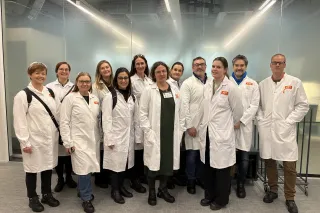Just published scientific article details the process of creating lab-grown coffee and shows proof of concept for the method. The research group was able to brew coffee from cells grown in a laboratory for the first time in 2021. Now, the process has been fully documented and released to the public.
Two years after its scientists in Finland successfully made coffee in a laboratory, VTT Research Centre of Finland has released detailed information on the process. Published in the Journal of Agriculture and Food Chemistry, the scientific paper describes the exact process the scientists used to produce coffee starting from the original coffee plant itself, and establishing cell cultures to alter its aroma in the roasting process, caffeine content, flavor analysis, and sensory profiling by a panel of tasters.
While demand for coffee is rising, the production of coffee beans faces multiple sustainability challenges, concerning land and water use, labourers’ rights, and climate change. According to the Centre for the Promotion of Imports, Europe, the highest consumer of coffee in the world, imported over 3,602 thousand tonnes (3.6 million tonnes) of green coffee in 2021, with an estimated average of 5 kg of coffee consumed per person each year.
Cellular agriculture provides a potential avenue for solving the main issues in coffee production in a sustainable way, also allowing for more regional self-sufficiency in areas with climates that are not suitable for coffee bean farming. In addition, lab-grown coffee has the potential to speed up coffee production significantly. Traditionally farmed coffee provides 1–2 harvests per year, whereas a new batch of lab-grown coffee can be made in a month due to the controlled process and the infinitely renewable nature of coffee plant cells that removes the need to grow new coffee plants from seeds.
However, the journey of lab-grown coffee to grocery store shelves and people’s kitchens is anything but complete. Dr. Heiko Rischer, Principal Scientist and Head of Plant Biotechnology at VTT, calls for an ecosystem dedicated to the production and commercialization of lab-grown coffee.
“It’s one thing to grow coffee cells in a bioreactor. Making it a commercially viable product is a whole other matter. The raw material derived from different cultivars and species, and the soil, the elevation, climate, and even the year when the particular coffee beans were grown plus the processes of roasting, fermentation, brewing, are all factors that impact the end product. While lab-grown coffee is much more controlled, different approaches to, for example, roasting significantly impact the aroma profile of the coffee which is a key consideration for the consumer,” elaborates Dr. Rischer.
Ideally, players interested in the same coffee value chain, such as cultivators, roasters, blenders, fermenters, and coffee brands could come together to build the processes required to produce and commercialize the new sustainable type of coffee.
“Our wish is that the publication of this scientific article, which clearly demonstrates proof of concept for lab-grown coffee, nudges forward the creation of an ecosystem or a collective that has the resources, know-how, and drive to pioneer an entirely new type of coffee. It is a huge challenge but one VTT is prepared to take on with the right partners and experts,” says Dr. Rischer.
Additional information
Additional materials:
- Journal of Agricultural and Food Chemistry: Proof of concept for cell culture-based coffee
- Centre for the Promotion of Imports: What is the demand for coffee on the European market?
- VTT’s 2021 announcement: Sustainable coffee grown in Finland – the land that drinks the most coffee per capita produces its first tasty cup with cellular agriculture





